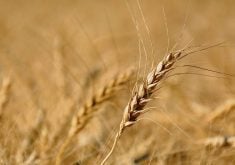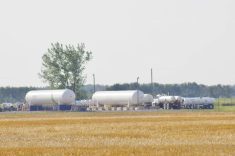Despite shaving $20 million in costs the CGC proposes a big increase in user fees so Ottawa no longer has to pay the bill
In its government-ordered drive to cost recovery, the Canadian Grain Commission (CGC) wants the grain industry to pay an extra $16.7 million a year in user fees effective Aug. 2013.
That’s a 44 per cent increase amounting to an extra $1.38 a tonne on total CGC-inspected Canadian grain exports. The figures are contained in the CGC’s 54-page User Fees Consultation and Pre-proposal Notification.
Some fees will skyrocket. For example, the CGC would charge $149.99 for outward inspection per rail car, truck or container — a whopping fivefold jump from the current charge of $29.
Read Also

Mazergroup’s Bob Mazer dies
Mazergroup’s Bob Mazer, who helped grow his family’s company into a string of farm equipment dealerships and the main dealer for New Holland machinery in Saskatchewan and Manitoba, died July 6 from cancer.
The CGC’s outward inspection fee for ships will rise 58 per cent to $1.60 a tonne from the current 51 cents.
The CGC will charge $46.99 to grade a grain sample versus the $15.10 to $24.47 it charges now.
Producer car application fees will increase 33 per cent to $26.50 compared to the $20 farmers pay now.
Citizens have until Nov. 30 to submit written responses to the CGC about the new fees.
Such a dramatic increase is a concern, Keystone Agricultural Producers’ president Doug Chorney said in an interview Nov. 2, adding KAP wants to study the fees further before passing final judgment.
“If the grain company pays it, it’s all going to come back through the basis to the farmer,” he said. “Any time we see costs borne by producers we’ve got to scrutinize it very carefully.”
More cost reductions needed
The CGC should make more services optional to reduce operating costs, said Wade Sobkowich, executive director of the Western Grain Elevator Association (WGEA). The association also says the federal government should cover the cost of CGC services, which benefit the nation.
Currently Ottawa contributes $5.45 million to CGC services identified as for the public good. The plan is to keep it the same.
If the CGC’s proposed user fees are implemented, the grain sector will cover 91 per cent of the CGC’s budget and the federal government the remaining nine per cent. Right now it’s split 50-50 between the government and the industry.
The fee increase could have been worse, according to the CGC. Amendments to the Canada Grain Act contained in the government’s omnibus Bill C-45, will cut CGC operating costs by $20 million. Initially the grain sector faced a doubling of CGC fees. Making CGC inward grain inspection at terminals and transfer elevators optional and other changes, will reduce costs.
According to the CGC, its new fees will amount to about $1.82 a tonne or just 1.9 and 2.2 per cent of the total cost of handling and transporting grain from the middle of the Prairies to Vancouver or St. Lawrence ports, respectively. Without changes CGC services would have cost around $3.07 a tonne.
“We found that our proposed fees appear to be low relative to maximum elevator tariffs,” the CGC states in its consultation document. “Because our fees are low relative to these elevator tariffs, the impact of our fees should have a lower impact than the fees for elevator services.”
Grain quality leader
The CGC says the services it will continue to charge for are critical to maintaining “Canada’s reputation as a leader in grain quality.”
The WGEA says the following CGC services are for the public good and the government should cover the costs: Grain Research Laboratory, the grain quality assurance system, maintaining grain quality standards, food safety activities, policy development, traceability and monitoring, producer security and other overhead costs.
The WGEA says grain industry users should only pay for the following services: producer car administration, subject to grade and dockage adjudication, elevator licensing and accreditation and certification of third parties to provide inspection services.
“For the remainder of CGC functions competitive alternatives must be allowed,” the WGEA says in a position paper. “This will ensure the CGC provides a competitive quality of service at a competitive price.”
The WGEA also questions whether the CGC has the legal authority to charge fees for many of its services, Sobkowich said. The User Fee Act only allows fees to be charged where the service “results in a direct benefit or advantage to the person paying the fee.”
The CGC document says its proposed user fees are consistent with those charged for similar services in the United States and Australia. However, the paper also says in 2011 the U.S. government covered 37 per cent of inspection fees with user fees covering the rest. If the CGC’s new fees are implemented the Canadian grain industry will cover 91 per cent of the bill. That puts Canada’s grain industry at a competitive disadvantage, Sobkowich said.
Request denied
The WGEA is also disappointed the House of Commons agriculture committee has rejected the association’s request to appear to state its position.
“I would think the largest user of CGC services should have a voice at the table, even if it’s only for a few minutes,” he said.
Chorney also says the federal government, not farmers, should pay for services that benefit the country. Where there’s a shared benefit Ottawa should cover 60 per cent of the cost and the industry 40. Services benefiting just users should be totally paid for by the user, he said.
While KAP wants the CGC to be efficient, it doesn’t want cost cutting to weaken its effectiveness.
“We can’t stop having an inspection system just to save money because we’ll pay in the end,” Chorney said. “We need an inspection system to protect the Canada brand and quality. Those are crucial things to maintain.”



















